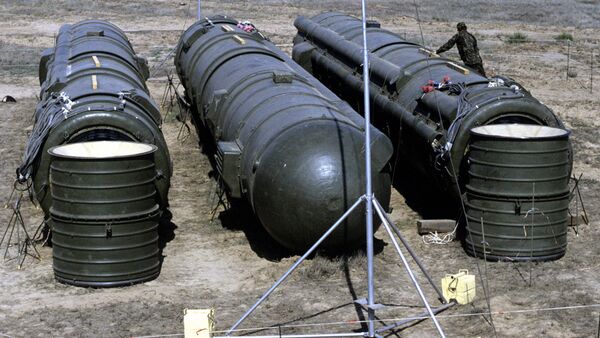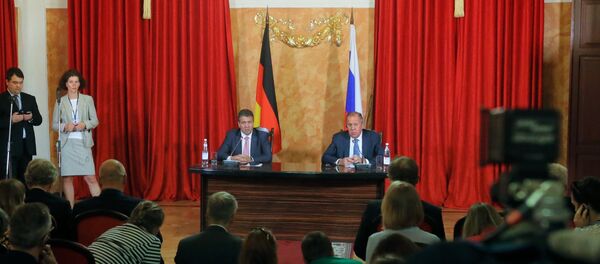EUROPE AS POTENTIAL BATTLEGROUND
Political scientist Heinz Gaertner, who is a member of the Advisory Board of International Institute for Peace, told Sputnik that breaking from the nuclear disarmament treaty could create a situation reminiscent of the 1980s, at the time of the nuclear arms race between the USSR and the United States.
"If the US withdrew from the Treaty, it would give Russia a free path to deploy new ground based missiles. They could basically cover all Europe. The US itself would not be prohibited to deploy intermediate cruise missiles on European soil … Europe could become a potential nuclear battleground," Gaertner said.
According to Gaertner, Washington’s withdrawal will result in Russia boosting its conventional and missile capabilities to offset NATO’s strength.
"A new Treaty on conventional weapons would become from unlikely to impossible. The new START-Treaty would unravel since the difference between strategic and non-strategic missiles will be blurred," Gaertner added.
The INF Treaty, signed in 1987, significantly reduced the arsenal of non-strategic missiles available to the United States and Russia, by prohibiting all nuclear and conventional missiles and their launchers with range between 310 and 3,420 miles.
The New Strategic Arms Reduction Treaty (START) between Russia and the United States, signed in 2010 and significantly limiting the number of strategic nuclear missile launchers, expires in 2021. In February, US President Donald Trump called the treaty a "one-sided deal" in an interview to Reuters, suggesting it was not fair to the United States.
Tom Sauer, an associate professor at the University of Antwerp, also pointed out that the withdrawal by either the United States or Russia might result in "the build-up of more weapon systems in Europe, the US and Russia."
"Nobody gains in this scenario, except the defense industry in the US and Russia," Sauer told Sputnik.
Sauer argued that the treaty issues are a symptom rather than the problem itself.
"To resolve the issue, the best would be to look at the root causes, which is finding a better political/geostrategic relationship between Russia and the West," Sauer said.
In his February 2017 article for the Global Policy Journal, the expert wrote that the West had failed to include Russia in a collective security architecture following the dissolution of the Soviet Union and suggested that remedying that is an urgent task.
POSSIBLE SOLUTIONS
The best solution for the INF treaty would be to use the Special Verification Commission, which was suggested in the text of the agreement as a procedure for resolving compliance-related issues, Sauer said.
"Russia could show the Russian missile (SSC-8) to the Americans, and Americans could allow control on its missile defense system in Romania to the Russians," the expert suggested.
In February of this year, the US media reported, citing an official from US President Donald Trump’s administration, that Russia had covertly deployed the ground-launched SSC-8 cruise missile in breach of the INF Treaty. Vice Chairman of the US Joint Chiefs of Staff General Paul Selva reiterated the accusation in March. In response, Kremlin spokesman Dmitry Peskov refuted the allegations, stressing that Russia was fully committed to the 1987 treaty and intended to keep up its commitment to all its international obligations.
"Moscow could offer better and improved verification measures to allay suspicions that Russia is violating the INF-Treaty," Gaertner said.
The initial verification procedure allowed as many as 20 annual short-notice inspections by each party for the first three years. The right to conduct inspections expired in 13 years since the signing of the agreement. At the moment, the Special Verification Commission is the main platform for discussing and solving compliance issues.
In an op-ed published in the Project Syndicate outlet in February, the four statesmen offered recommendations on reducing the nuclear threat. One such suggested was to begin discussions between the United States and Russia on eventually and significantly reducing the percentage of strategic nuclear forces from prompt-launch status. Another recommendation was the penning of a joint declaration by the two countries’ leaders on the futility of a nuclear war.
"Another constructive idea would be to negotiate a multilateral treaty with respect to medium-range missiles: open up this bilateral treaty to other states in the world; that would fit the global disarmament agenda," Sauer added.
According to Gaertner, Washington should back Russia in turning the Treaty into a multilateral agreement to alleviate Moscow’s fears of "intermediate range missiles from Asia."
Calogero also spoke in favor of a multilateral treaty rather than a bilateral one, explaining that "otherwise there will always be strong pressure within the USA and within Russia emphasizing the fact that only these two countries are bound by the INF Treaty."
A number of other countries with considerable arsenals could become a party to such an agreement. US Pacific Command (PACOM) head Adm. Harry Harris suggested in April that Washington should look into renegotiating the treaty, adding that certain aspects of the treaty that prevented the United States from being able to effectively counter China and other countries were "problematic."
Sauer pointed out that arms control could serve as a means to improve relations in general, but someone would have to take the first step.
"The US could for instance unilaterally withdraw the US tactical nuclear weapons in Europe as a result of the NW Ban treaty, something states like Germany, the Netherlands and Belgium (and even Italy and Turkey) would agree with. It would then be up to Russia to reciprocate positively by withdrawing the Russian tactical nuclear weapons further east (to the Urals or further)," Sauer suggested.
An even better solution, according to him, would be to conclude a bilateral treaty on tactical nuclear weapons.
Calogero suggested that the INF treaty was "one of several fundamental subjects on which the strategic interests of the USA and Russia coincide," adding that "reasonable responsible leaders should take due note of these facts and work consequently towards cooperation rather than confrontation."
Sauer also proposed that Trump and Russian President Vladimir Putin could use their possible meeting on the sidelines of the upcoming G20 summit in Hamburg, slated for July 7-8, to mend the relationship between Moscow and Washington, on the issue of arms control, among others.
A senior Russian Foreign Ministry nonproliferation department official said earlier in the day that US exit from from the treaty would threaten the entire nuclear arms control regime. Department for Nonproliferation and Arms Control (DNAC) Deputy Director Vladimir Leontiev said that Russia could not rule out the possibility of Washington unilaterally pulling out of the agreement. Leontiev added that Moscow would welcome a conversation with the United States on strategic balance.




